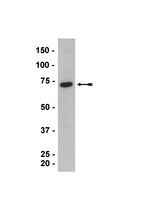Autophosphorylation of threonine 485 in the activation loop is essential for attaining eIF2alpha kinase activity of HRI.
Rafie-Kolpin, Maryam, et al.
Biochemistry, 42: 6536-44 (2003)
2003
Show Abstract
In heme deficiency, protein synthesis is inhibited by the activation of the heme-regulated eIF2alpha kinase (HRI) through its multiple autophosphorylation. Autophosphorylation sites in HRI were identified in order to investigate their functions. We found that there were eight major tryptic phosphopeptides of HRI activated in heme deficiency. In this report we focused on the role of autophosphorylation at Thr483 and Thr485 in the activation loop of HRI. Disruption of the autophosphorylation of Thr485, but not Thr483, resulted in a lower autokinase activity and locked Thr485Ala HRI in a hypophosphorylated state. Most importantly, autophosphorylation of Thr485, but not Thr483, was essential for attaining eIF2alpha kinase activity of HRI. In addition, autophosphorylation of Thr485 was necessary for arsenite-induced activation of the eIF2alpha kinase activity of HRI, while autophosphorylation at Thr483 was not required for activation by arsenite. The function of Thr490, another conserved Thr residue in the activation loop of HRI, was also investigated. Mutations of Thr490 to either Ala or Asp resulted in reduced autokinase activity and loss of eIF2alpha kinase activity in heme deficiency or upon arsenite treatment. Since Thr490 was not identified as an autophosphorylated site, it is likely that Thr490 itself might be critical for the catalytic activity of HRI. Importantly, Thr485 was very poorly phosphorylated in Thr490 mutant HRI. Collectively, our results demonstrate that autophosphorylation of Thr485 is essential for the hyperphosphorylation and activation of HRI and is required for the acquisition of the eIF2alpha kinase activity. | 12767237
 |
Visibly stressed: the role of eIF2, TIA-1, and stress granules in protein translation.
Anderson, Paul and Kedersha, Nancy
Cell Stress Chaperones, 7: 213-21 (2002)
2002
Show Abstract
Eukaryotic cells express a family of eukaryotic translation initiation factor 2 alpha (eIF2alpha) kinases (eg, PKR, PERK-PEK, GCN2, HRI) that are individually activated in response to distinct types of environmental stress. Phosphorylation of eIF2alpha by one or more of these kinases reduces the concentration of eIF2-guanosine triphosphate (GTP)-transfer ribonucleic acid for methionine (tRNA(Met)), the ternary complex that loads tRNA(Met) onto the small ribosomal subunit to initiate protein translation. When ternary complex levels are reduced, the related RNA-binding proteins TIA-1 and TIAR promote the assembly of a noncanonical preinitiation complex that lacks eIF2-GTP-tRNA(Met). The TIA proteins dynamically sort these translationally incompetent preinitiation complexes into discrete cytoplasmic domains known as stress granules (SGs). RNA-binding proteins that stabilize or destabilize messenger RNA (mRNA) are also recruited to SGs during stress. Thus, TIA-1 and TIAR act downstream of eIF2alpha phosphorylation to promote SG assembly and facilitate mRNA triage during stress. The role of the SG in the integration of translational efficiency, mRNA stability, and the stress response is discussed. | 12380690
 |
The eIF-2alpha kinases and the control of protein synthesis.
de Haro, C, et al.
FASEB J., 10: 1378-87 (1996)
1996
Show Abstract
Protein synthesis is regulated in response to environmental stimuli by covalent modification, primarily phosphorylation, of components of the translational machinery. Phosphorylation of the alpha subunit of eIF-2 is one of the best-characterized mechanisms for down-regulating protein synthesis in higher eukaryotes in response to various stress conditions. Three distinct protein kinases regulate protein synthesis in eukaryotic cells by phosphorylating the alpha subunit of eIF-2 at serine-51. There are two mammalian eIF-2alpha kinases: the double-stranded RNA-dependent kinase (PKR) and heme-regulated inhibitor kinase (HRI), and the yeast GCN2. The regulatory mechanisms and the molecular sizes of these eIF-2alpha kinases are different. The expression of PKR is induced by interferon, and the kinase activity is stimulated by low concentrations of double-stranded RNA. HRI is activated under heme-deficient conditions. Yeast GCN2 is activated by amino acid starvation. The phosphorylation of eIF-2alpha results in the shutdown of protein synthesis. Nevertheless, the eIF-2alpha kinases can regulate both global as well as specific mRNA translation. Inhibition of protein synthesis correlates with eIF-2alpha phosphorylation in response to a wide variety of different stimuli, including heat shock, serum deprivation, glucose starvation, amino acid starvation, exposure to heavy metal ions, and viral infection. Finally, recent studies suggest a role for eIF-2alpha phosphorylation in the control of cell growth and differentiation. | 8903508
 |
Regulation of protein synthesis by heme-regulated eIF-2 alpha kinase.
Chen, J J and London, I M
Trends Biochem. Sci., 20: 105-8 (1995)
1995
Show Abstract
Protein synthesis is regulated by the phosphorylation of the alpha-subunit of eukaryotic initiation factor 2 (eIF-2 alpha) in a variety of cells. At present, there are two distinct mammalian eIF-2 alpha kinases that have been cloned, the double-stranded-RNA-dependent eIF-2 alpha kinase (PKR) and the heme-regulated eIF-2 alpha kinase (HRI). HRI is activated under conditions of heme deficiency in immature erythroid cells, and its activity is inhibited by heme. The high levels of HRI in reticulocytes indicate that its major physiological role is the regulation of protein synthesis, particularly of hemoglobin, according to the concentration of heme in these cells. | 7709427
 |











